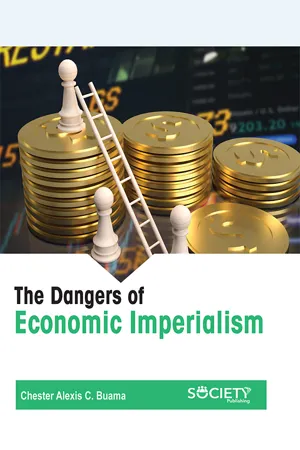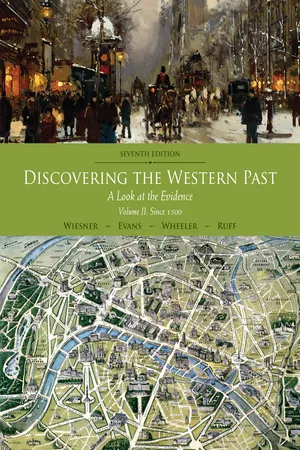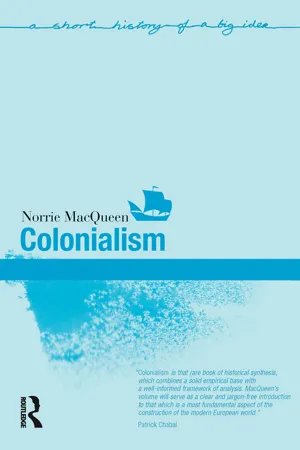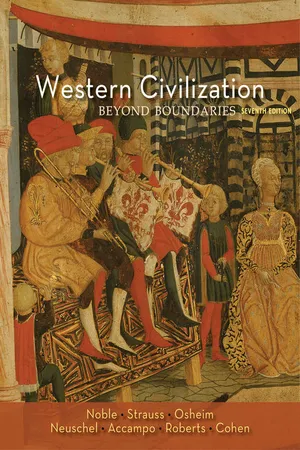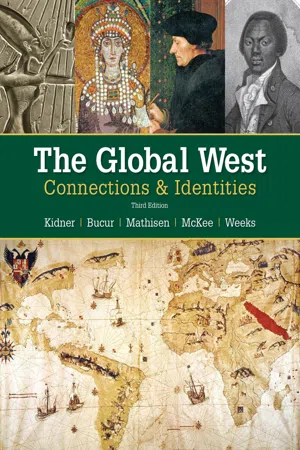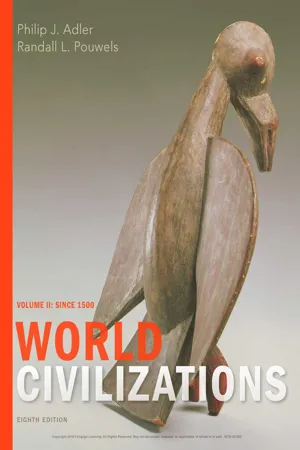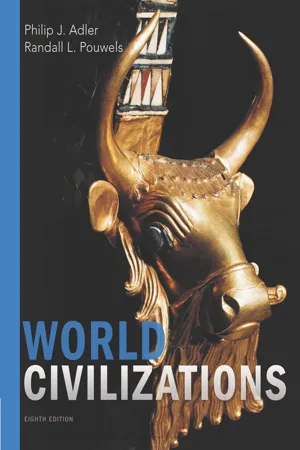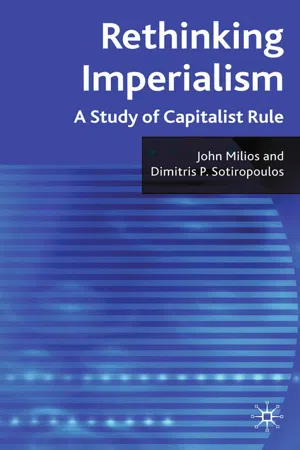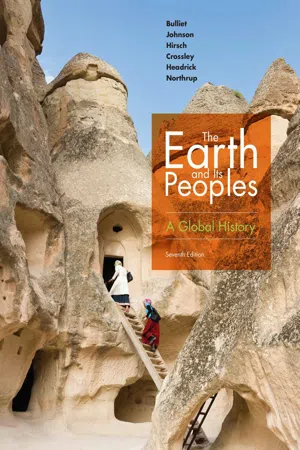History
New Imperialism
New Imperialism refers to the late 19th and early 20th-century expansion of European powers into Africa, Asia, and the Pacific. Motivated by economic interests, nationalism, and the desire for global dominance, imperialist nations sought to acquire colonies, resources, and markets. This period was characterized by aggressive military conquest, exploitation of indigenous peoples, and the imposition of colonial rule.
Written by Perlego with AI-assistance
Related key terms
1 of 5
10 Key excerpts on "New Imperialism"
- eBook - PDF
- Chester Alexis C. Buama(Author)
- 2023(Publication Date)
- Society Publishing(Publisher)
‘A dozen years ago, this vocabulary would have been unimaginable,’ says Becker. The approach’s acceptance was hampered by an unwillingness to view education as an accumulating physical asset with economic opportunities. 3.3.2. New Imperialism Western Europe pursued an imperial policy known as New Imperialism from the late 1800s through the early 1900s. This New Imperialist Age was fueled by economic, military, political, humanitarian, and religious factors, as well as the creation and adoption of a new theory of Social Darwinism and technological developments. Economic Reasons By 1870, European industrialized nations needed to extend their worldwide markets to sell items that could not be sold on the continent. Business people and bankers had additional cash to spend, and overseas ventures, despite the dangers, incentivized higher earnings. The necessity for cheap labor and a consistent supply of raw commodities such as oil, rubber, and manganese for steel compelled the industrial nations to retain strict control over these uncharted territories. The imperialists believed that the industrial economy could function appropriately by directly governing these territories and establishing colonies under their direct rule. However, the New Imperialism’s economic advantages were limited since the new settlements were too impoverished to spend money on European goods. Military and Political Reasons European countries likewise saw colonies as critical to military might, national security, and nationalism. Military officials thought that becoming a great power required a powerful fleet. The Dangers of Economic Imperialism 68 As a result, navy warships need military bases worldwide to load coal and supplies. To meet these demands, harbors were taken. Colonies provided secure ports and coaling depots for Europe’s expanding warships, which were critical in times of conflict. The decision to occupy Egypt was motivated by concerns about national security. - eBook - PDF
Discovering the Western Past
A Look at the Evidence, Volume II: Since 1500
- Merry E. Wiesner-Hanks, Andrew Evans, William Bruce Wheeler, Julius Ruff(Authors)
- 2014(Publication Date)
- Cengage Learning EMEA(Publisher)
[238] CHAPTER NINE EXPANSION AND PUBLIC OPINION: THE DEBATE OVER THE “New Imperialism” THE PROBLEM From the 1870s until around 1905, Western nations engaged in a brief but extremely intense period of im-perial expansion. In one sense, of course, this was not entirely a new phenomenon. From the sixteenth through the eighteenth centuries, the emerging nations of Western Europe had struggled over possession of the New World. Between roughly 1815 and 1871, the West, beset with inter-nal problems, had engaged in only limited attempts at colonialism, but some nations, principally England, nevertheless had sought to expand their economic spheres of influence. In some ways, then, the “new impe-rialism” of the late nineteenth century was not dramatically different from the old. Yet to many living at the time (as well as to a number of later historians), the imperialism of the late nineteenth and early twentieth centuries seemed markedly different from earlier forms of territorial expansion. For one thing, the number of contestants for empire had increased with the addition of the newly formed nations of Germany and Italy. Indeed, even the United States, itself a nation composed of for-mer European colonies, joined in the headlong scramble for new territo-ries. The increased number of empire-seeking nations probably contributed to the speed with which unclaimed areas were brought under Western control. Another factor that made the colo-nial expansion of the late nineteenth and early twentieth centuries ap-pear “new” was that many people believed that this was their nation’s last opportunity to build or enlarge an empire. Only Africa and part of Asia remained vulnerable to imperi-alist ventures. Awareness of this fact filled the nations of the West with a sense of urgency. If a nation did not acquire colonies quickly, other na-tions would do so. This urgency Copyright 201 Cengage Learning. All Rights Reserved. May not be copied, scanned, or duplicated, in whole or in part. - Fatemah Alzubairi(Author)
- 2019(Publication Date)
- Cambridge University Press(Publisher)
On Imperialism, Colonialism, and Neo-Colonialism 21 which can be economic, strategic, or even cultural in nature, with minimal or no military involvement and without claiming sovereignty. It suggests the exercise of the essence of an imperial policy without the direct engagement of the empire’s formal representatives. The elites in the colonized territories often play a significant role in these imbalanced power relations, as they link the imperial power with its indigenous policymakers. 11 This form of control can exist prior to, after, or between periods of colonialism. For example, Juan Cole argues that during the eighteenth and nineteenth centuries, particularly in the Middle East, “colonies often existed before colonialism.” 12 This means that imperialism dominated many parts of the world politically and economically whether or not direct colonization took place. 13 Informal empire still exists in our current time where it is described as “neo- colonialism” (discussed below). This book is concerned with imperialism only within a specific timeline: the “New Imperialism” 14 that prevailed from the eighteenth century onward, and its major Western players, above all Britain and France, and later the United States. Imperialism paved the way for direct colonialism. Britain and France engaged in direct colonial control all over the world including in the Arab region. The United States, although it did not have colonies in the Arab world, colonized the Philip- pines, Puerto Rico, Hawaii, Guam, Samoa, and the Virgin Islands. 15 Nonetheless, the United States remains a later colonial player than Britain and France, which were the most influential colonial leaders of their time. Colonialism refers to the direct military and political occupation and expansion overseas by the European powers, which spread widely during the nineteenth and twentieth centuries and which sought to protect the colonists’ political and eco- nomic interests.- eBook - ePub
- Norrie Macqueen(Author)
- 2014(Publication Date)
- Routledge(Publisher)
CHAPTER 2The ‘New Imperialism’: colonialism to the First World War
WHAT WAS NEW about the ‘New Imperialism’ of the nineteenth century? In many ways, it could be argued, not all that much. Yes, industrialization altered the economic nature of colonialism. It also changed the social setting in which it was pursued. By opening a technological gap between colonizer and colonized, both the processes and the social relations of colonialism had changed. But it is possible to see these as incremental rather than fundamental transformations. Mercantilism, after all, had given way to free-trade imperialism without bringing a basic change in how European power was exercised overseas. Colonial powers had gained and lost dominance over the previous four centuries, and the geographical focus of colonization had changed frequently without altering the general tempo of the enterprise. However, the striking feature of the New Imperialism was the extent and rapidity of change across all aspects of the colonial venture.The sheer pace and range of expansion was breathtaking. In the thirty years before the First World War, an average of around 600,000 square kilometres of the global South was colonized annually by the global North. At the end of this period Europe controlled the major part of the earth's surface. Much of this was acquired through the so-called scramble for Africa. This added the huge landmass of the continent below the Sahara to a colonial swag-bag already loaded with the Asian and American possessions taken in earlier centuries. In addition, the New Imperialism saw the geographical reach of the colonizers extend much further than previously into the Asia-Pacific region. By 1900 colonial rule had already been imposed on 90 per cent of Africa, more than half of Asia and almost the totality of the South Pacific. More than a quarter of the Americas remained under colonial rule despite the disintegration of Spanish and Portuguese power there over the previous century. - eBook - PDF
Western Civilization
Beyond Boundaries
- Thomas F. X. Noble, Barry Strauss, Duane Osheim, Kristen Neuschel(Authors)
- 2013(Publication Date)
- Cengage Learning EMEA(Publisher)
Scandinavians, Italians, Germans, Britons, Portuguese, and other groups each left a cultural and economic imprint on their adopted lands, introducing new customs, tastes, and farming techniques. This phenomenal expansion of overseas migrations added to Europe’s global influence. But the more dramatic impact of European influence in this era assumed the form of ambitious conquest. The term New Imperialism differentiates this phase of European expansion from the earlier stage of empire building, which had focused on the Americas. Nineteenth-century imperialism centered on Africa and Asia. Prior to this era, Africa had remained largely unknown and impenetrable because of its jungles, rainforests, and deserts. A new breed of explorer overcame these obstacles, backed up with popular enthusiasm in the media and mass participation in politics. New Imperialism Era of European overseas expansion launched in the 1880s. Europeans subjugated 500 million people in Africa and Asia. Petersen: Emigrants Preparing to Depart Edward Petersen’s 1890 painting depicts Danish emigrants preparing to leave their homeland. Between 1860 and 1914, 300,000 people emigrated from the small country of Denmark, most of them to the United States. Courtesy of the Aarhus Kunstmuseum. Reproduced with permission of Thomas, Poul, and Ole Hein Pedersen, Aarhus Copyright 2012 Cengage Learning. All Rights Reserved. May not be copied, scanned, or duplicated, in whole or in part. Due to electronic rights, some third party content may be suppressed from the eBook and/or eChapter(s). Editorial review has deemed that any suppressed content does not materially affect the overall learning experience. Cengage Learning reserves the right to remove additional content at any time if subsequent rights restrictions require it. The New Imperialism and the Spread of Europe’s Influence 685 Economic and Social Motives The desire for huge markets and the hope for profit—much of it illusory—stirred an interest in empire. - eBook - PDF
- Frank Kidner, Maria Bucur, Ralph Mathisen, Sally McKee(Authors)
- 2018(Publication Date)
- Cengage Learning EMEA(Publisher)
CHAPTER 24 Chapter Outline 24-1 Motives and Methods of the New Imperialism 24-1a Economic Motivations 24-1b Domestic Politics and National Rivalries ANALYZE & COMPARE: Two Views of Imperialism: Cecil Rhodes and Lin Zexu 24-1c Christian Missions 24-1d The “White Man’s Burden” 24-1e The Importance of Technology 24-2 The Scramble for Africa 24-2a Settler Colonies in South and North Africa 24-2b The Belgian Congo 24-2c The Berlin Conference and German Colonies 24-2d The Boer War 24-3 The British Raj in India 24-3a Commerce and Trade 24-3b The Sepoy Rebellion PROFILES IN CHANGE: Cecil Rhodes Creates the Rhodes Scholarship 24-3c The Jewel in the Crown 24-3d British Order and Indian Culture 24-4 Imperialism and the Muslim World 24-4a Russian Expansion 24-4b The Ottoman Empire 24-4c Muslims, Christians, and Zionists 24-5 The Far East 24-5a The French in Indochina 24-5b The Dutch in Indonesia 24-5c Concessions in China 24-5d The Westernization of Japan 24-6 Consequences and Critics 24-6a A Global Economy 24-6b Indigenous Resistance 24-6c Imperialism and European Culture 24-6d Capitalism and Imperialism CHAPTER REVIEW ❱ ❱ What is meant by the term imperialism ? Why did European power throughout the world expand so quickly in this period? ❱ ❱ Where did the New Imperialism have its greatest impact? Why? ❱ ❱ What impact did imperialism have on the Muslim world, Asia, and Africa? ❱ ❱ Why did most Europeans support imperialism? What were the arguments of Europeans who opposed it? As you read, consider the following questions: The Age of Imperialism, 1870–1914 Copyright 2019 Cengage Learning. All Rights Reserved. May not be copied, scanned, or duplicated, in whole or in part. Due to electronic rights, some third party content may be suppressed from the eBook and/or eChapter(s). Editorial review has deemed that any suppressed content does not materially affect the overall learning experience. - eBook - PDF
World Civilizations
Volume II: Since 1500
- Philip Adler, Randall Pouwels(Authors)
- 2017(Publication Date)
- Cengage Learning EMEA(Publisher)
The Scramble for Africa perhaps remains the most spectacular and irrational example of the New Imperialism, yet much of Asia and the Pacific islands were also the objects of a huge land grab by the United States and Japan as well as the European powers. This chapter explores the background of the New Imperialism and the European colonial period in Africa, and Chapter 37 examines the case of China. BACKGROUND OF THE New Imperialism, 1790–1880 Before 1880 only Algeria and Cape Colony (South Africa) were under direct European control. By 1914, only Ethiopia and Liberia remained outside formal European control. What factors caused this sudden turn of events? Rivalry for New Markets By the last quarter of the nineteenth century, the eco- nomic and military situation among the European powers was shifting rapidly. In this era of the Second Industrial Revolution, Britain faced serious competition from other nations—especially Germany and the United States—for industrial supremacy, and its balance of trade went into deficit. Furthermore, Europe as a whole suffered from a depression that lasted from 1873 to 1896. This long depres- sion contributed greatly to the New Imperialism because the Western powers sought new markets for their manu- factured goods and sources of the raw materials needed to keep their industrial plants operating. In addition, many financiers in Europe and the Untied States sought invest- ment opportunities in new markets that offered seemingly endless supplies of cheap labor and little or no competition. In the past, protected “spheres of influence” or colonies— particularly white settler colonies—around the globe had Copyright 2018 Cengage Learning. All Rights Reserved. May not be copied, scanned, or duplicated, in whole or in part. WCN 02-300 The Scramble for Africa, 1880–1914 485 THINKING ABOUT THIS MAP Note the French, British, Belgian, and Portuguese possessions. - eBook - PDF
- Philip Adler, Randall Pouwels(Authors)
- 2017(Publication Date)
- Cengage Learning EMEA(Publisher)
The Scramble for Africa perhaps remains the most spectacular and irrational example of the New Imperialism, yet much of Asia and the Pacific islands were also the objects of a huge land grab by the United States and Japan as well as the European powers. This chapter explores the background of the New Imperialism and the European colonial period in Africa, and Chapter 37 examines the case of China. BACKGROUND OF THE New Imperialism, 1790–1880 Before 1880 only Algeria and Cape Colony (South Africa) were under direct European control. By 1914, only Ethiopia and Liberia remained outside formal European control. What factors caused this sudden turn of events? Rivalry for New Markets By the last quarter of the nineteenth century, the eco- nomic and military situation among the European powers was shifting rapidly. In this era of the Second Industrial Revolution, Britain faced serious competition from other nations—especially Germany and the United States—for industrial supremacy, and its balance of trade went into deficit. Furthermore, Europe as a whole suffered from a depression that lasted from 1873 to 1896. This long depres- sion contributed greatly to the New Imperialism because the Western powers sought new markets for their manu- factured goods and sources of the raw materials needed to keep their industrial plants operating. In addition, many financiers in Europe and the Untied States sought invest- ment opportunities in new markets that offered seemingly endless supplies of cheap labor and little or no competition. In the past, protected “spheres of influence” or colonies— particularly white settler colonies—around the globe had Copyright 2018 Cengage Learning. All Rights Reserved. May not be copied, scanned, or duplicated, in whole or in part. WCN 02-200-202 The Scramble for Africa, 1880–1914 485 THINKING ABOUT THIS MAP Note the French, British, Belgian, and Portuguese possessions. - eBook - PDF
Rethinking Imperialism
A Study of Capitalist Rule
- J. Milios, D. Sotiropoulos(Authors)
- 2009(Publication Date)
- Palgrave Macmillan(Publisher)
It is then that we encounter a number of extreme racist approaches, chiefly in England (in the works of Benjamin Kidd and Karl Pearson) and Germany (in the works of Friedrich Naumann, Friedrich von Bernhardi and Houston Stewart Chamberlain). Influenced by the logic of social Darwinism, these analyses did not seek out the origins of imperialism in the economic sphere. On the contrary, they judged that since the white race is ‘superior’ to the other, coloured races, its destiny and duty is to exercise dominion over them. Imperialism is portrayed in essence as a purely biological (in the racial sense) phenomenon: it has to do with the struggle for the survival of the most powerful ‘race’. 2 Among the first writers to incorporate systematically into their analy- sis a purely political definition of imperialism was the Austrian theoreti- cian, Heinrich Friedjung. According to his argumentation, imperialism should be regarded as a phenomenon of power politics in which the state is the decisive agent of history. 3 What we see formulated, in other words, is an intellectual orientation that much later came to be associated primarily with the so-called realist approach. This is in reality a suitably theorized systematization of views that were widespread in public debate. Many theoreticians and politicians of the time were in the habit of viewing the imperialistic expansion of the great European powers as an ineluctable political process: the world of the future would be dominated by great empires, and any nation-state which did not join their ranks was condemned to an inferior status. 4 In a speech in 1897, Chamberlain, for example, reaffirmed the above asser- tion in the most unambiguous way: ‘it seems to me that the tendency of the time is to throw all power into the hands of the greater empires, and the minor kingdoms – those which are non-progressive – seem to be destined to fall into a secondary and subordinate place’ (quoted in Mommsen 1982: 6). - eBook - PDF
The Earth and Its Peoples
A Global History
- Richard Bulliet, Pamela Crossley, Daniel Headrick, Steven Hirsch(Authors)
- 2018(Publication Date)
- Cengage Learning EMEA(Publisher)
In spite of Western attempts to restrict it to the role of junior partner, Japan continued to increase its regional influence. After gaining control of southern Manchuria with its indus-tries and railroads, Japan annexed Korea in 1910, joining the ranks of the world’s colonial powers. Yamagata Aritomo One of the leaders of the Meiji Restoration. ▲ Imperialists Dismember China This period cartoon shows an outraged figure representing China throwing up his hands in horror as England (represented by Queen Victoria), Germany (represented by the Kaiser), Russia (represented by the Tzar), France, and Japan divide Chinese territory among themselves. This cartoon was originally published in January 1898 in the Parisian magazine Le Petit Journal . INTERFOTO/Alamy Stock Photo Section Review $ China was weakened by the Taiping Rebellion, a reac-tionary government under Empress Dowager Cixi, and the demands of the West. $ Japan, in contrast, built up its military and industrial strength and became another imperial power, taking advantage of China’s weakness to seize Korea, Taiwan, and southern Manchuria. Copyright 2019 Cengage Learning. All Rights Reserved. May not be copied, scanned, or duplicated, in whole or in part. Due to electronic rights, some third party content may be suppressed from the eBook and/or eChapter(s). Editorial review has deemed that any suppressed content does not materially affect the overall learning experience. Cengage Learning reserves the right to remove additional content at any time if subsequent rights restrictions require it. 724 CHAPTER 27 The New Power Balance, 1850–1900 27-7 Conclusion After World War I broke out in 1914, many people, especially in Europe, looked back on the period from 1850 to 1914 as a golden age. For some, and in certain ways, it was. Industrializa-tion was a powerful torrent changing Europe, North America, and East Asia.
Index pages curate the most relevant extracts from our library of academic textbooks. They’ve been created using an in-house natural language model (NLM), each adding context and meaning to key research topics.
